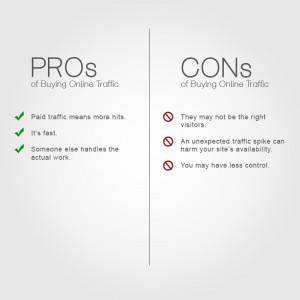As everyone involved in buying or selling online knows, traffic is the lifeblood of e-commerce. Whether you’re generating page hits for an ad-supported site or drumming up business for an online store, you need people to visit your site in as great a number as possible. More than that, you need the right people to visit your site: people who are interested in what your enterprise has to offer. Without traffic, you are certain to fall behind your competitors, losing revenue and eventually going under.
What is Targeted Traffic?
In the final analysis, targeted traffic is the only kind of traffic that matters. Targeted traffic consists of visits from consumers who have specifically searched for your information, products or services. Such visitors are focused on obtaining what your site has to offer. Random traffic can mean a tsunami of visitors but if they all hit the back button as soon as they visit your site, this doesn’t translate into increased revenue.
In fact, large amounts of untargeted traffic can represent a net negative. Those hits don’t contribute anything to your enterprise, yet you still have to pay for the bandwidth they consume.
Buying Traffic
One way to generate more targeted traffic is by using various paid services. These include relatively obvious and transparent methods, such as advertising on sites that are relevant to your potential consumers, well-designed direct marketing email campaigns or paid inclusion in search results; as well as more doubtful techniques such as “astroturfing” (paying people to discuss your services on blogs, social networks or message boards as if they were spontaneously raising the subject).
Buying traffic may look like the ideal solution — but is it really everything that purveyors of such services claim? Let’s take a look at some of the pros and cons of buying online traffic.
Pro #1: Paid traffic means more hits.
Virtually any paid traffic tactic will genuinely net you plenty of new visitors.
Con #1: They may not be the right visitors.
A flood of untargeted or poorly-targeted traffic may do very little to justify the money paid to generate it. It matters little if you receive a thousand new visitors overnight if not one of them is interested in buying your product or making use of the service your enterprise offers. Even if you are only making money through page views, it’s still better to attract visits from people who want to be on your site. These visitors are the ones who’ll return time and time again and who will tell their friends about your site. Visitors who aren’t particularly interested in your content won’t come back and certainly won’t be sharing links to your page.
Pro #2: It’s fast.
This is one of the top claims of companies that claim to boost online traffic for a fee. It’s true up to a point; strategically placed links can certainly generate plenty of new traffic towards your website, often very rapidly. Paid traffic is certainly a much faster way to raise the number of hits to your page than simply waiting for consumers to stumble across your web site via search results or other more organic means.
Con #2: An unexpected traffic spike can harm your site’s availability.
Even if your foray into paid traffic is effective, you may find yourself the victim of your own success. A sudden influx of hits can compromise your site or result in increased costs. Virtually every Web hosting contract specifies an upper limit on the amount of data that can be sent to and from their servers with respect to a particular site. Each new hit consumes a small fraction of your bandwidth; taken together, they can be more than enough to exceed the maximum data allowance. This generally results in one of two things, depending on the kind of contract you have. Either your site is disabled by your hosting company until the traffic declines or you make arrangements to upgrade your hosting package to a higher traffic one; or you find yourself being automatically billed for overages.
Pro #3: Someone else handles the actual work.
Paying someone else to drum up extra traffic for you, whether it’s by placing ads on their site, posting links in other locations around the web or through targeted direct email campaigns, lets you get on with other aspects of your business and maximizes your time usage.
Con # 3: You may have less control.
Unless you choose wisely, paid traffic can create more trouble than its worth. An unscrupulous company might, for example, take your money just to simply spam a list of random addresses with unwanted emails. Things get even more complicated if your paid traffic generation involves a social networking strategy. Handled well, social network campaigns can be a great way to generate buzz, encourage traffic and develop and incentivize a loyal consumer base. Handled poorly, such campaigns are intrusive and generate ill feeling towards the responsible companies. The result would either show no appreciable rise in traffic or worse – an influx of annoyed Web users who’d had their online experience disrupted and your company takes the blame.
Conclusion
Buying online traffic has its advantages and disadvantages. It could improve your profits as long as you remember to
- Pick a reputable provider,
- Consider the effect that a rise in Web traffic will have on your bandwidth and,
- Ensure that you have quality content ready for your visitors.







